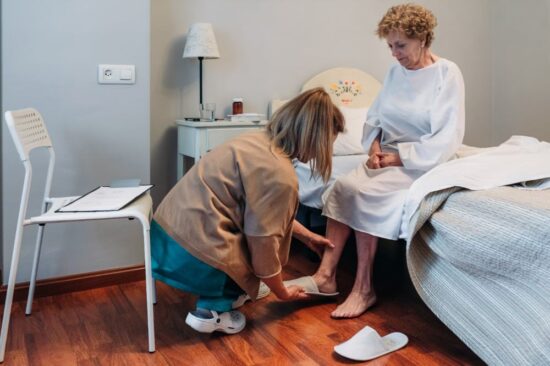Caring for loved ones who are ill, injured, or have chronic conditions, such as Alzheimer’s and Parkinson’s disease, can be fulfilling and, at times, challenging. Most caregivers are responsible for helping with personal care needs, preparing meals, managing medications, finances, providing transportation for medical care, and so much more. Juggling schedules for appointments and giving care is a daily challenge. It is an understatement when we say caregivers have busy schedules. The everyday struggles and added stress of being a caregiver can often lead to emotional and sometimes physical health risks to the caregiver.
This blog is for educational purposes only and should not be considered legal advice. The use of the Paths Law Firm website does not constitute a client-lawyer relationship.
Who are Caregivers?
Most caregivers find themselves in the role of caring for a loved one or family friend based on necessity rather than experience or skill. The care approach is a learning experience. It seems everyone has a busy life, so being a caregiver includes added responsibilities such as career, household responsibilities, and parenting. Who are caregivers? They are your neighbors, friends, family members, and millions of Americans across the United States.
Over the last 12 months, approximately 41.8 million (16.8%) Americans have provided informal care for adults over 50. This number is up from 14.3% in 2015. According to Statista, 16.9% of the US population is 65 or older and expected to increase to 22% by 2050. The increase in an aging population means the number of caregivers will increase as well.

Caregiver Needs and Emotional Support
If you know someone who is a caregiver, you know they put in countless hours day and night making sure their care recipient is cared for with respect and dignity. So, who is taking care of our caregivers? We should not ignore the importance of emotional support and self-care for caregivers. When caregivers ignore their needs, they may experience higher stress levels, depression, anxiety, and health-related issues. Juggling the demands of the recipient and their responsibilities can lead to caregivers becoming burned out.
Tips to Practice Self Care
If you are a caregiver or know someone that is providing care, the below tips can help you practice self-care:
Don’t Let Guilt Get in the Way of Caring for Yourself
Taking care of your health and sanity should be a top priority. If you are not taking care of yourself, how can you care for someone else? Let go of the guilt you might feel for taking a break for your health and emotional needs. We are all human, and we all have needs we must take care of to stay healthy and happy.
Your Nutrition is Just as Important as Your Care Recipients
Most caregivers have a schedule overflowing with things they need to do. For many, this means eating on the go, quickly packaged meals, or not eating regular meals. Skipping meals and eating fast food can harm your health. With the added stress of caring for others, your nutrition is critical. Make sure you are eating as healthy as possible. Try eating several small meals each day and including healthy proteins, vegetables, and fats. Be sure to drink at least eight glasses of water every day and avoid processed foods when possible. Eating a balanced diet can help you stay both physically and mentally healthy.

Reward Yourself
As a caregiver, you deserve to reward yourself from time to time. Your reward can be as simple as ordering your favorite food, buying an outfit you have wanted, or even relaxing in the bathtub listening to your favorite music. Whatever you choose as a treat, be sure it is something making you feel happy.
Make Sure You are Getting Rest
Getting the right amount of sleep for your body and mind to function correctly is extremely important, especially for caregivers with added stress. If you find you have trouble sleeping even when you feel exhausted, try taking a hot shower or bath before bed. There are many different natural remedies you can use to help with insomnia, such as listening to calming music and avoiding drinks with caffeine before bedtime.
Make Time for Daily Exercise
Exercising doesn’t mean you have to spend hours in a gym. You can get a great workout in the privacy of your own home. You can find some great online workout videos to get started, such as walking workouts or yoga. It is also a good idea to get outside and exercise. Try taking a walk in your neighborhood doing yoga in the backyard.

Don’t Say Yes When You Should Say No
Saying yes to everyone is not healthy. If you say yes to everyone, you will overextend yourself, which can add stress and anxiety to your already busy life. Ensure you prioritize the most important things, and if something doesn’t fit your schedule, say no. Your friends and family will understand.
Talk to Friends or Family Everyday
It is essential to reach out and talk to someone besides the person you are caring for every day. Talking provides an outlet for you to stay social or even vent when you are upset or stressed. Staying social is a vital aspect of your health and wellbeing.
Spend Time with Friends and Family
Create a calendar to track all the things you need to do. A calendar will allow you to see at a glance what you have coming up and will enable you to block out time to spend with family and friends. Spending time with people other than your care recipient gives you time away to destress and relax. This time away can be joyful and healing.

Ask for Help When you Need it
Caring for your loved ones can be extremely rewarding, but over time you may become burned out. When you find yourself overwhelmed and unable to get everything done on your calendar, ask for help. Ask friends, family, or even community members to lend a helping hand. It may feel awkward, but the fact is everyone needs help from time to time.
Consider Joining a Support Group
The job of a caregiver can be isolating and lonely without support. Consider joining a support group for caregivers in your community. Joining a group can help you, sharing ideas for care, and make you feel not entirely alone. There are different types of care groups possibly beneficial to join. You can find support groups in your area by searching online or reaching out to a caring community for recommendations.

Be Kind to Yourself
It’s easy to beat yourself up for the things you don’t have time to do or even the things you feel you could have done better. Take one day at a time and be sure to include self-care. Caring for yourself is one of the best ways not to become overwhelmed or burned out.
Know When Enough is Enough
As a caregiver, you want to do everything you can to provide the best possible care for your loved one. However, at some point, your care recipient may need help you cannot offer. It is essential to understand your limitations and what level of care you can provide. When the level of care required exceeds what you can give, it may be necessary to choose a nursing home for your loved one.

A Final Note
At Paths Elder Law, we understand how difficult it is to be a caregiver. We have been working with seniors and their families for over 30 years, helping them plan for long-term care through Medicaid or VA and other benefits, estate planning, asset protection, and much more.
Our highly skilled and experienced staff is here to listen to your needs and create a plan to assist you with your journey. We are here to help you and your family and to provide guidance for eldercare issues. If you or a loved one requires assistance, contact Paths Elder Law to schedule a consultation.



































